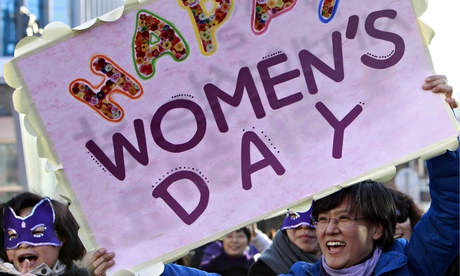Ruby Johnson and Devi Leiper O'Malley
Frida: the Young Feminist Fund
What does it mean in today's world to take an established tradition and make it your own? We are young women of the millennial generation, with more than 100 International Women's Days (IWD) gone by. We live in an era of increasing inequalities of wealth and resources and continue to witness a frightening backlash against women's rights gained to date.
IWD remains meaningful to us because we see young feminist activists claiming this day as their own, gathering at the forefront of today's most heated disputes, demanding access to abortion, amplifying voices of sex workers, or seeking justice for the disappearances of women human rights defenders. They are casting off the taboo of feminism, applying new social media technologies and drawing on the arts to make these celebrations relevant and expressive of multiple realities, identities, and movements.
Each year, IWD falls around the annual session of the UN commission on the status of women (CSW), a key policymaking space for governments to make commitments to women's human rights. However the CSW remains a somewhat exclusive space that many people have not heard of or find difficult to enter and influence. Global decision-making spaces for women's human rights continue to fall outside of the popular gaze. This is a dangerous disconnect. IWD is just one day, while the CSW could potentially guarantee that every day will be women's rights day in practice.
Despite the barriers, young women are finding alternative ways to contribute to an age-old struggle. Whether hashtagged in tweets, composed into songs, or included in official statements at the UN, we believe the groundswell of young feminist activism can revitalise the power and potential of decision-making spaces like the CSW or IWD with radical solutions, strategies, and spirit.
The value of IWD is in our ability to integrate these new voices and find the threads that weave us together. This will enable us to strengthen interconnected movements and collectively speak truth to power.
-----------------------------------------------------------------
Fatima Haase, policy and advocacy assistant
Progressio
On Saturday a number of my friends will post something on Facebook to celebrate women or speak out against gender inequality. International Women's Day makes it easy for young people to put on their part-time activist T-shirts. It's great. Ordinary people will get excited about women's rights, if only for the day.
But, those of us who've invested in a professional wardrobe to fly the flag for feminism need a serious think. Are we doing enough to educate and motivate the public to really challenge societal norms that lead to discrimination against women?
We need to tackle difficult questions such as: how can we increase the number of young women in leadership positions? Why don't young women have the same access to employment and participation in decision-making as young men? International Women's Day will spark these debates and steer public opinion. That's why we need it.
However, we also need to raise the profile of negotiations such as the UN CSW. While it might not sound trendy, opportunities such as this can be harnessed to influence decision makers, policymakers and ultimately the international laws that can be used to secure and protect women's rights.
The more ordinary people that can add their voices to the debate, the more chance the outcome document will have of being rooted in people's experiences. The more the negotiations reflect our reality the more useful they can be in bringing about the changes we want to see. Yet even my friend with the T-shirt has never heard of the CSW.
Let's hope International Women's Day 2014 will draw attention to the thousands of activists gathering in New York and to those people all over the world who continue to work for gender equality. Let's inspire people to keep wearing the T-shirt long after 8 March.
---------------------------------------------------------------------------------------
Zemach Getahun, gender and business development adviser
Farm Africa:
"In the beginning my husband opposed my involvement in the village savings and loans association, but after observing the change brought to our family he decided to join, and we now compete with one another to see who saves more."
In 2012, at a UN Women and African Union symposium, I had the pleasure of hearing Etenesh Daniel speak about how she manages a financing group in Ethiopia. Etenesh wasn't a typical speaker at this meeting of African ambassadors and UN officials – she is an Ethiopian farmer.
Her speech symbolised why International Women's Day is important. It is the one day in the year when the amazing contributions made to ordinary lives by extraordinary women are recognised and celebrated.
In my work as the gender and business development adviser for Farm Africa, I work alongside Ethiopian women who bravely voice their desire for equal opportunities and an end to harmful traditional practices.
It is estimated that closing the gender gap in agriculture could reduce the number of hungry people in the world by 12-17%. At Farm Africa we know that women have a crucial role to play in the development of the rural economy. That is why we design projects that empower women like Etenesh.
We have challenges here in Ethiopia, but we take this day to celebrate and recognise the contribution of women to our society, and we must keep making progress toward equality. I know that inequality isn't just a developing world problem, how many female leaders are there around the world?
